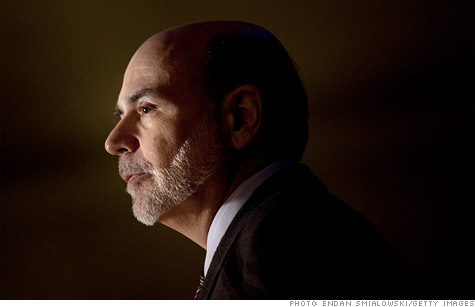Search News

Federal Reserve chairman Ben Bernanke has downplayed the chances of another recession but has acknowledged recent economic weakness.
NEW YORK (CNNMoney) -- Ben Bernanke and the rest of the Federal Reserve have grown more pessimistic about the state of the U.S. economy.
At the conclusion of a two-day policy meeting, the central bank said that while the recovery is continuing at a moderate pace, growth is somewhat slower than expected. It also said the jobs market is "weaker than anticipated."
It also issued new economic projections that call for slower economic growth, higher unemployment and higher inflation in 2011 and 2012 than in its previous forecast. At a press conference Wednesday afternoon, Fed chairman Bernanke referred to the new forecast as a significant revision.
The Fed said in its statement that it believed some of the headwinds would be short-lived, including supply disruptions from the Japanese earthquake, and the "effect of higher food and energy prices on consumer purchasing power."
But Bernanke said he and other Fed policymakers aren't certain how much of the weakness is due to those temporary factors and how much is due to longer-lasting problems.
He said continued problems in the housing market, excess private sector debt and weakness in the financial sector might be more serious than previously thought. And he suggested the labor market is a long way from being healed.
"We project unemployment to come down very painfully and slowly," he said. "We're still some years away from full employment of 5.5%. That's very frustrating."
He said that the Fed's forecast assumes no additional shocks to the U.S. economy. But a default by the Greek government on its debt could be such a shock.
While U.S. banks have limited exposure to Greek sovereign debt, they do have significant exposure to European banks that would themselves be affected by such a default.
"The impact on the United States would be quite significant," Bernanke said.
Stocks fell slightly following Bernanke's press conference but traded in a fairly narrow range as there was little in the way of new news from the Fed chairman.
Still, there has been a significant slowdown in hiring and disappointing overall growth in recent months that have caused stocks to pull back. The weak economic readings have led many economists to cut their growth forecasts. It has also raised fears of the economy possibly falling into a new recession, although that is still seen as a long shot.
The Fed appeared to downplay the chance of another downturn, saying that it "expects the pace of recovery to pick up over coming quarters and the unemployment rate to resume its gradual decline."
Bernanke said that even though the economy is weaker than had been hoped at this point, it is stronger than last August when he first signaled the Fed was looking at taking additional steps to help the economy.
He noted that last summer, the labor market was even weaker, and that there was a significant risk of deflation.
Keith Hembre, chief economist with Nuveen Asset Management, said he thinks despite the Fed's projection of better growth ahead, the outlook is still uncertain.
"Officially they're on the optimistic side, and they probably remain hopeful," he said. "But they've probably got some doubts about it."
The Fed also dismissed inflation fears voiced by some economists, saying that it believes "inflation will subside" and that "longer-term inflation expectations have remained stable."
But it did drop language in earlier statements that "measures of underlying inflation are still subdued," suggesting that there are more concerns about the increase in core inflation readings.
The Fed's latest effort to help the economy was through the purchase of $600 billion in long-term Treasuries, a program that ends this month. Known as the second round of quantitative easing or QE2 for short, it was designed to keep interest rates low.
But the controversial program is widely believed to have been of limited help to the economy. Some also argue that QE2 has contributed to the weakening of the dollar and an unwelcome rise in commodity prices, particularly oil.
While Bernanke dismissed the need for additional asset purchases or other steps in the near term, the Fed could be forced to come up with another round of quantitative easing later in the year if it doesn't get the rebound in growth it is looking for, said Keith Springer, president of Springer Financial Advisors.
"They're afraid to come out with a QE3, even though they know we'll need one," he said. "I think they feel like they'll have egg on their face. But they didn't do QE1 and QE2 to let the economy die now."
The Fed also left the fed funds rate, its key interest rate used as a benchmark for a wide range of business and consumer borrowing, near 0%, where it has been since December 2008. It repeated that it believes economic conditions are likely to "warrant exceptionally low levels for the federal funds rate for an extended period."
And Bernanke, when asked just how long the "extended period" could last, suggested that rates will stay near zero for awhile.
"Depending upon how the economy evolves, it could be significantly longer," he said. ![]()
| Overnight Avg Rate | Latest | Change | Last Week |
|---|---|---|---|
| 30 yr fixed | 3.80% | 3.88% | |
| 15 yr fixed | 3.20% | 3.23% | |
| 5/1 ARM | 3.84% | 3.88% | |
| 30 yr refi | 3.82% | 3.93% | |
| 15 yr refi | 3.20% | 3.23% |
Today's featured rates:
| Latest Report | Next Update |
|---|---|
| Home prices | Aug 28 |
| Consumer confidence | Aug 28 |
| GDP | Aug 29 |
| Manufacturing (ISM) | Sept 4 |
| Jobs | Sept 7 |
| Inflation (CPI) | Sept 14 |
| Retail sales | Sept 14 |